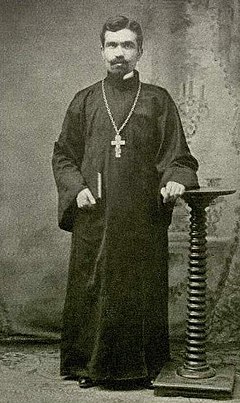June Revolution

Fan Noli, the leader of the revolution
|
|
| Date | June 1924–24 December 1924 |
|---|---|
| Location | Albania |
| Participants | Albanian society |
| Outcome |
|
Albanian Orthodox leader Fan Noli's supporters blamed the murder of Avni Rustemi on Ahmet Zogu's Mati clansmen, who continued to practice blood vengeance. After the walkout, discontent mounted, and in June 1924 a peasant-backed insurgency had won control of Tirana. The June Revolution resulted in Noli becoming prime minister, and Zogu's flight to Yugoslavia.
Interwar Albanian governments appeared and disappeared in rapid succession. Between July and December 1921 alone, the premiership changed hands five times.
The Popular Party's head, Xhafer Ypi, formed a government in December 1921 with Fan S. Noli as foreign minister and Ahmed Bey Zogu as internal affairs minister, but Noli resigned soon after Zogu resorted to repression in an attempt to disarm the lowland Albanians despite the fact that bearing arms was a traditional custom. When the government's enemies attacked Tirana in early 1922, Zogu stayed in the capital and, with the support of the British ambassador, repulsed the assault. He took over the premiership later in the year and turned his back on the Popular Party by announcing his engagement to the daughter of the Progressive Party leader, Shefqet Verlaci. Zogu's protégés organized themselves into the Government Party. Noli and other Western-oriented leaders formed the Opposition Party of Democrats, which attracted all of Zogu's many personal enemies, ideological opponents, and people left unrewarded by his political machine. Ideologically, the Democrats included a broad sweep of people who advocated everything from conservative Islam to Noli's dreams of rapid modernization.
Opposition to Zogu was formidable.Orthodox peasants in Albania's southern lowlands loathed Zogu because he supported the Muslim landowners' efforts to block land reform; Shkodër's citizens felt shortchanged because their city did not become Albania's capital, and nationalists were dissatisfied because Zogu's government did not press Albania's claims to Kosovo or speak up more energetically for the rights of the ethnic Albanian minorities in present-day Yugoslavia and Greece.
...
Wikipedia
